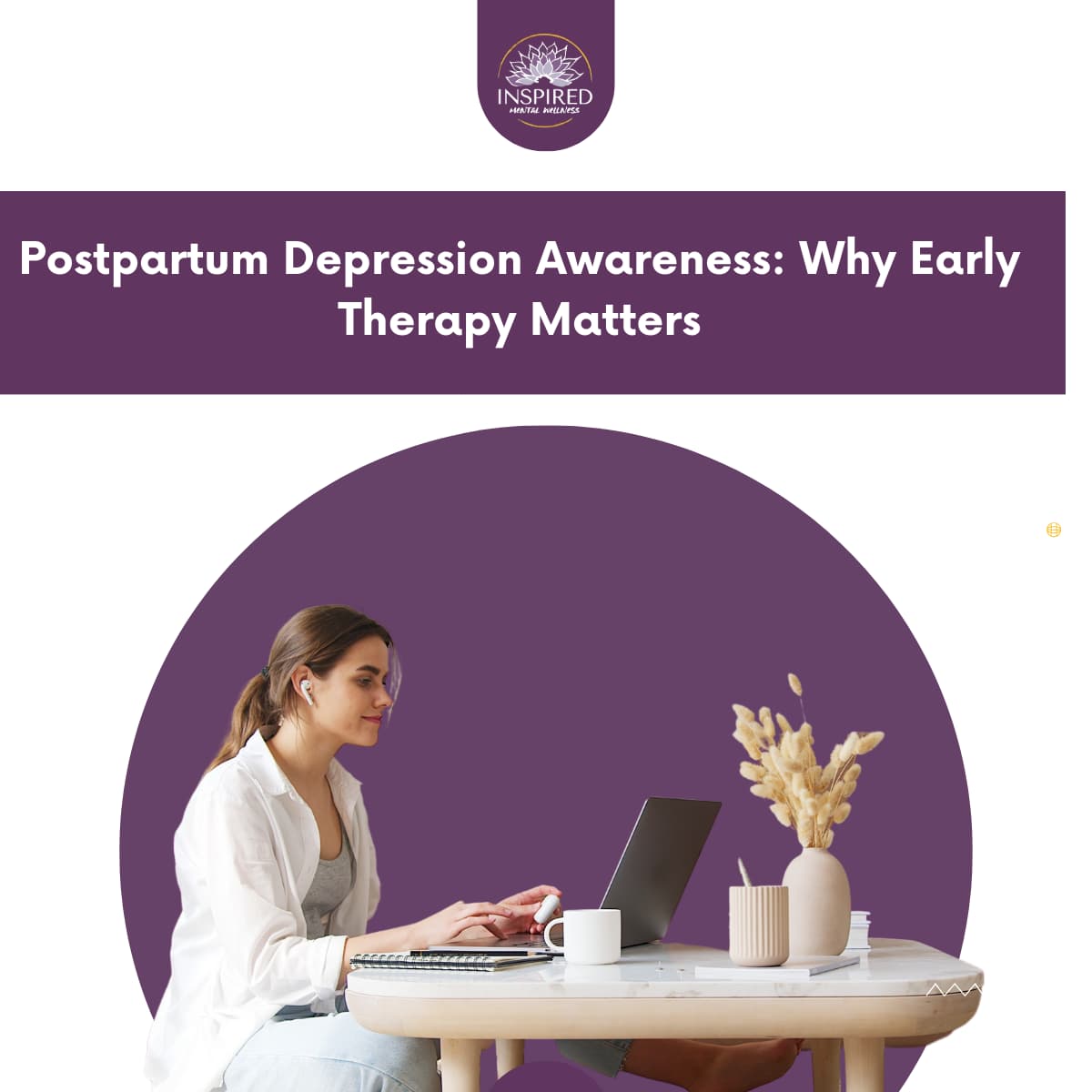The Inspired Blog
April 27, 2025

Are you feeling overwhelmed, anxious, or unlike yourself after welcoming your new baby?
You’re not alone, and you don’t have to go through it alone, either. Postpartum depression (PPD) is a serious but common mental health condition that affects 1 in 7 new mothers. It’s more than just the “baby blues,” and without early support, it can deeply affect both you and your baby.
I believe that early therapy for postpartum depression can be life-changing. I provide compassionate and personalized services to mothers in Texas who may be struggling with postpartum mental health concerns, both in person and through convenient online therapy sessions. My goal is to create a safe, nonjudgmental space where you feel heard, supported, and empowered to navigate this challenging time. You don’t have to go through this alone. I’m here to help you find healing, hope, and a path forward.
What Is Postpartum Depression?
Postpartum depression is a mood disorder that occurs after childbirth. It can develop weeks or even months after delivery, making it important for new parents and loved ones to recognize the signs early.
Common signs of postpartum depression include:
- Persistent sadness, hopelessness, or anxiety
- Fatigue or low energy despite rest
- Difficulty bonding with the baby
- Mood swings or irritability
- Trouble sleeping or sleeping too much
- Feelings of guilt, shame, or worthlessness
- Thoughts of harming oneself or the baby (in severe cases)
Understanding Postpartum Depression
Postpartum depression is more than just the “baby blues.” While many new mothers experience mood swings, anxiety, and sadness after childbirth, PPD is a more severe and prolonged condition that can interfere with daily life. Symptoms may include:
- Persistent sadness or low mood
- Loss of interest in activities
- Difficulty bonding with the baby
- Fatigue and sleep disturbances
- Feelings of hopelessness or worthlessness
- Changes in appetite
Recognizing these symptoms is crucial for timely intervention. Many mothers may feel isolated or ashamed, believing they should be able to handle the challenges of motherhood on their own. This stigma can prevent them from seeking help, leading to prolonged suffering.
Why Early Therapy for PPD Is So Important
Early therapy is crucial for effectively addressing mental health issues, such as postpartum depression, anxiety, and other emotional challenges. Timely intervention can lead to better outcomes, including improved emotional well-being, enhanced coping strategies, and stronger family dynamics. By seeking help early, individuals can reduce the severity of symptoms, foster healthier relationships, and create a supportive environment for recovery. Recognizing the signs and prioritizing mental health care not only benefits the individual but also strengthens the overall family unit.
1. Effective Treatment
Research shows that early intervention can significantly improve outcomes for mothers experiencing PPD. Therapeutic approaches, such as cognitive-behavioural therapy (CBT) and interpersonal therapy (IPT), have proven effective in addressing the symptoms of postpartum depression. By starting therapy early, mothers can learn coping strategies and gain tools to navigate their feelings.
2. Enhanced Bonding with the Baby
When mothers receive the support they need, they are better equipped to bond with their babies. Early therapy can help alleviate feelings of guilt and inadequacy, allowing mothers to engage more positively with their children. This bonding is crucial for the child’s emotional development and overall well-being.
3. Support for the Whole Family
Postpartum depression doesn’t just affect the mother; it impacts the entire family. Early therapy can provide education and support for partners and family members, helping them understand what the mother is experiencing. This support network is essential for recovery and can foster a more nurturing environment for the baby.
4. Reducing Stigma
By promoting awareness of postpartum depression and the benefits of early therapy, we can help reduce the stigma surrounding mental health issues. Encouraging open conversations about PPD can empower mothers to seek help without fear of judgment.
Conclusion
Postpartum depression is a serious condition that deserves attention, understanding, and care. Early therapy can make a significant difference in a mother’s recovery journey, helping to restore emotional balance, rebuild confidence, and strengthen the bond between mother and baby. If you or someone you know is struggling with postpartum depression, please don’t hesitate to reach out. You don’t have to face this challenge alone.
At Inspired Mental Wellness, I offer a safe, compassionate space where you can begin healing at your pace. Whether through in-person sessions or convenient online therapy, I’m here to support you every step of the way. Your mental wellness matters, and help is just a conversation away.